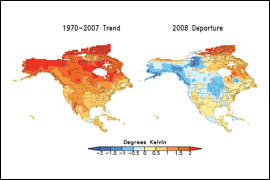North American 2008 Cooling Attributed to Natural Causes
Cool sea surface temperatures overrode warming
December 4 2009

Left side: 1970-2007 trend in annual surface air temperature. Right sid: 2008 annual surface air temperature, shown as a departure from the 1971-2000 climatology. |
Cooler North American temperatures in 2008 resulted from a strong natural effect, and the overall warming trend that has been observed since 1970 is likely to resume, according to university and NOAA scientists.
"Our work shows that there can be cold periods, but that does not mean the end of global warming. The recent coolness was caused by transitory natural factors that temporarily masked the human-caused signal," said Judith Perlwitz, lead author of the study and a researcher with the Cooperative Institute for Research Environmental Sciences, and NOAA Earth System Research Laboratories, both in Boulder, Colo. The paper will be published Dec. 8 in Geophysical Research Letters.
Using computer-generated models as well as observations, the team analyzed causes for climate variations in the recent decades. Special emphasis was given to the reasons for North American coolness in 2008. The research is an exercise in climate attribution, a scientific process for identifying the sources of observed climate and weather patterns. Climate attribution is a vital part of NOAA's climate services.
"We found that North American coolness resulted from a strong bout of naturally caused cooling in the tropical and northeastern Pacific sea surface temperatures," said Martin Hoerling, a NOAA meteorologist and co-author. "This illustrates how regional patterns can vary independent of the overall global average. In 2008, global land temperatures were the sixth warmest on record, whereas it was the coldest year in North America since 1996."
The analysis included historical data and climate model simulations that were conducted in the U.S. and internationally. The science team discerned both natural and human-caused influences for 2008.
"North American temperatures would have been considerably colder in 2008 had there been no human-induced warming influence present," Perlwitz said.
The scientists conclude that the North American temperatures are likely to resume increasing again, and do not see the recent coolness as an emerging downward trend.
"Our work shows the importance of the role of natural climate variability in temporarily masking or enhancing human-induced climate change. Through diagnosis, we ensure that natural changes, when occurring, are not misunderstood to mean that climate change is either not happening or is happening more intensely than the expected human influence," said Arun Kumar, a NOAA meteorologist and co-author.
Authors of A strong bout of natural cooling in 2008 are Judith Perlwitz, Cooperative Institute for Research in Environmental Sciences, Boulder, Colo., and NOAA Earth System Research Laboratories, Boulder, Colo.; Martin Hoerling, NOAA Earth System Research Laboratories, Boulder, Colo.; Jon Eischeid and Taiyi Xu, both of the Cooperative Institute for Research in Environmental Sciences, Boulder, Colo., and NOAA Earth System Research Laboratories, Boulder, Colo.; and Arun Kumar, NOAA Climate Prediction Center, Camp Springs, Md.
The work was funded by the NOAA Climate Program Office.
| Contact: Judith Perlwitz |